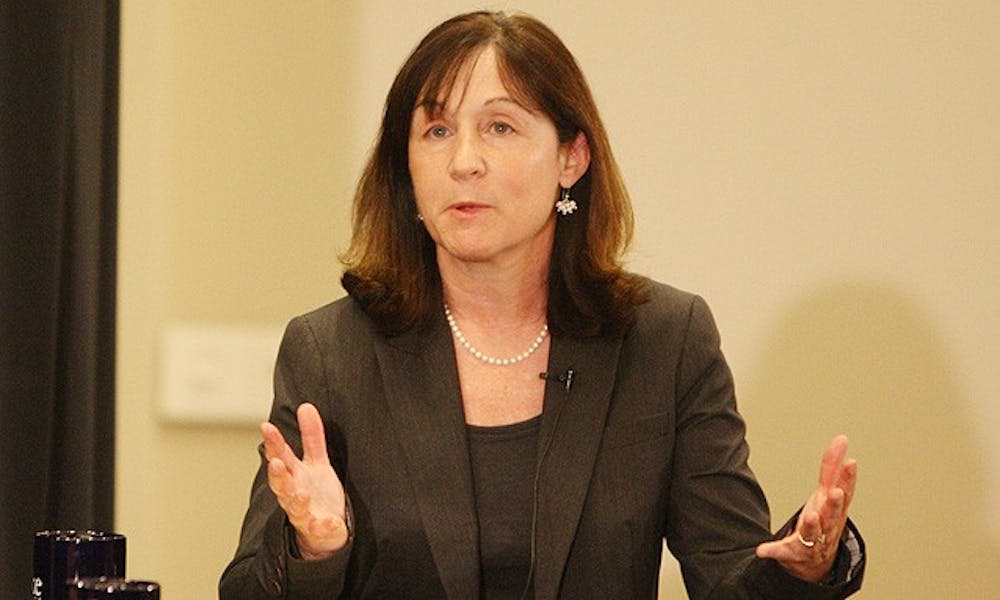Prize-winning investigative journalist Jane Mayer spoke in the Sanford School of Public Policy Monday night about covering the war on terror.
Mayer said she began investigating the legality and effectiveness of extraordinary rendition—in which prisoners are transferred to other countries—after she became aware that the practice was being used by the CIA to torture prisoners. During her reporting, she was surprised to find numerous military and FBI officials opposed to the use of renditions and torture, she said.
In fact, one of the first experts Mayer interviewed on the subject was Dan Coleman, an FBI agent who worked with the CIA’s bin Laden unit and was vehemently opposed to the practice. According to Mayer, Coleman told her that torture would yield bad information because prisoners were willing to say anything to stop the interrogations.
Mayer’s appearance, presented as a discussion between her and Philip Bennett, Eugene C. Patterson professor of the practice of journalism and public policy and former managing editor of The Washington Post, was this year’s Ewing Lecture on Ethics. The discussion centered on her coverage of the war on terror and the legally and ethically questionable actions committed by the CIA and the administration of former President George W. Bush. Mayer is a staff writer for The New Yorker magazine and recently wrote a book about the war on terror titled “The Dark Side.”
Mayer discussed the difficulties involved in her investigations, stating that the refusals of CIA and government officials to comment on the issues made her reporting a challenge. It was not until the release of pictures of detainees being tortured at Abu Ghraib, an American military prison in Iraq, that government officials were emboldened to comment on the practices and be more openly critical, she said.
“I think Abu Ghraib was the turning point in a lot of ways,” she explained. “I’m sorry to say as someone who works with words that when you look at pictures, it makes things more real to people.”
Mayer eventually reported on the CIA’s development of an extensive and sophisticated program of torture. She explained that military psychologists involved in directing Survival, Evasion, Resistance and Escape—a program that trains soldiers to survive and resist hostile situations, including torture– were being consulted on how to “psychically demolish” detainees by using techniques such as waterboarding as well as more subtle methods, such as playing unpleasant sounds.
“The experts who had been trained on fighting torture had become the experts on designing torture,” she said.
Mayer said she believes that questioning whether torture is justified if it helps to save lives is a false dilemma. Indeed, according to Mayer, the FBI and the military knew that torture was not only an ineffective means to obtain accurate information, but also led to negative sentiments regarding the United States. However, she said, members of the CIA had little interrogation experience and truly believed in the necessity of their actions.
Mayer added that these techniques were “designed in desperation by frightened officials who didn’t know what to do.”
Reporting on the issue was important because it gave people information about government activity, which Mayer said is important to democracy.
“I’ve got a lot of trust in the American people and what they will do with the information,” she said. “If the reaction to what the government is doing is this toxic, then [the government] shouldn’t be doing it. I think that’s the answer.”
Though many of the topics discussed were addressed in “The Dark Side,” sophomore Fei Chen said she appreciated Mayer’s insight beyond what was written in the book.
Following the discussion, members of the audience were given the chance to ask questions. John Karugia, a visiting scholar from the University of Leipzig who is originally from Kenya, asked Mayer whether she, like reporters in some other countries, ever felt threatened when questioning important officials. Mayer replied that she has never received a death threat.
“I thought it was very informative,” Karugia said of the talk. “What surprised me is that you can talk about these things so openly in the U.S.”
Get The Chronicle straight to your inbox
Signup for our weekly newsletter. Cancel at any time.

